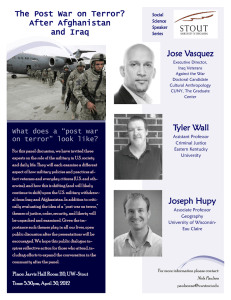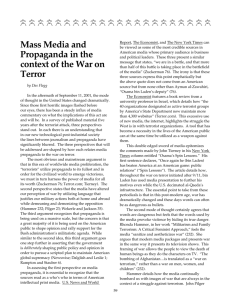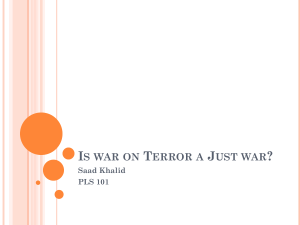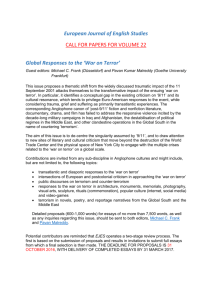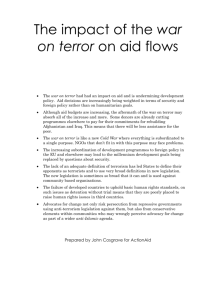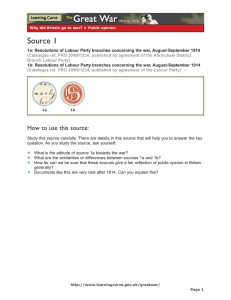New Labour and the new world order
advertisement
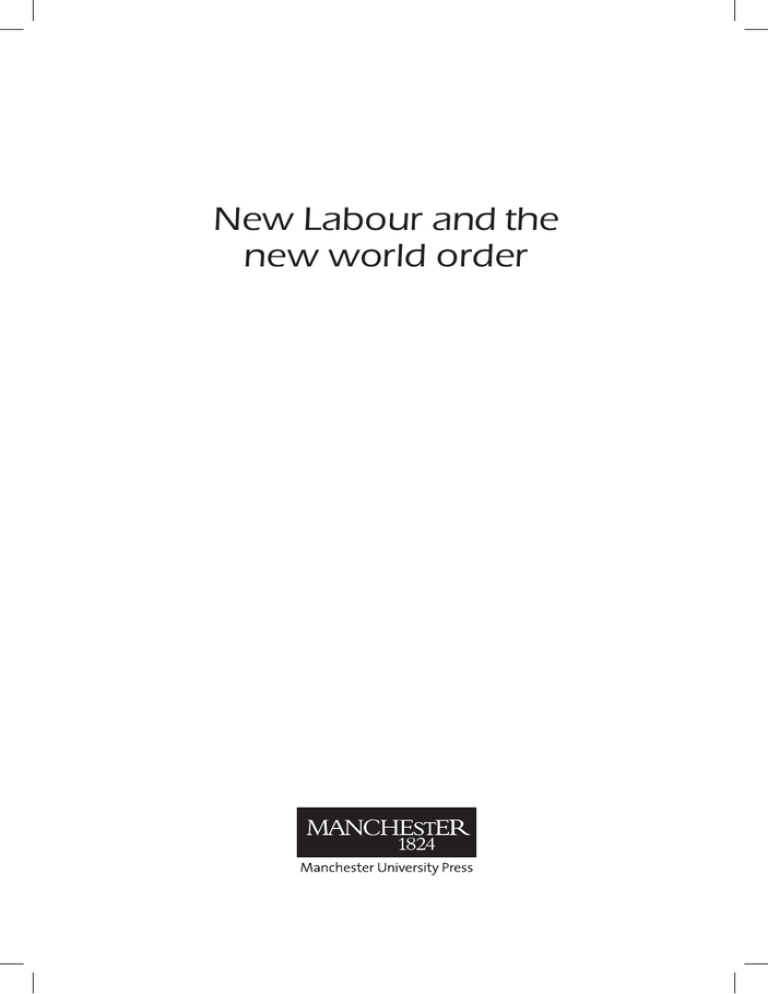
New Labour and the new world order For Zach New Labour and the new world order Britain’s role in the war on terror Steven Kettell Manchester University Press Manchester and New York distributed in the United States exclusively by Palgrave Macmillan Copyright © Steven Kettell 2011 The right of Steven Kettell to be identified as the author of this work has been asserted by him in accordance with the Copyright, Designs and Patents Act 1988. Published by Manchester University Press Oxford Road, Manchester M13 9NR, UK and Room 400, 175 Fifth Avenue, New York, NY 10010, USA www.manchesteruniversitypress.co.uk Distributed in the United States exclusively by Palgrave Macmillan, 175 Fifth Avenue, New York, NY 10010, USA Distributed in Canada exclusively by UBC Press, University of British Columbia, 2029 West Mall, Vancouver, BC, Canada V6T 1Z2 British Library Cataloguing-in-Publication Data A catalogue record for this book is available from the British Library Library of Congress Cataloging-in-Publication Data applied for ISBN 978 0 7190 8136 1 hardback First published 2011 The publisher has no responsibility for the persistence or accuracy of URLs for any external or third-party internet websites referred to in this book, and does not guarantee that any content on such websites is, or will remain, accurate or appropriate. Typeset by Frances Hackeson Freelance Publishing Services, Brinscall, Lancs Printed in Great Britain by ?????? Contents Preface Acknowledgements 1 Introduction 2 Old and new 3 Barbarians at the gates 4 Chaos 5 Above the law 6 A road well travelled 7 Brown’s war 8 Elysian fields 9 Decline and fall References Index page vi vii 1 6 25 45 71 95 120 146 172 185 196 Preface The ‘war on terror’ has shaped and defined the first decade of the twentyfirst century. Launched by the US in the wake of the 9/11 attacks, the declared objective of the campaign was to deal with the threat posed by a confluence of rogue states, international terrorism and weapons of mass destruction. The underlying dynamics, however, were conditioned by a shift in the US towards a new imperialist strategy of global reordering that had been set in train since the end of the Cold War. In this endeavour, Washington enjoyed staunch support from a New Labour government keen to elevate Britain’s influence in international affairs. This included British participation in the invasions of Afghanistan and Iraq, support for extra-legal measures taken by the US, and a diminution of civil liberties through punitive anti-terror legislation. Ostensibly set within a political framework of promoting humanitarian values, the Labour government’s conduct in the war on terror proved to be largely counter-productive. Eroding trust between the citizenry and the state, putting the armed forces under increasing strain, reducing Britain’s global position and exacerbating the threat from radical Islamic terrorism, the consequences will be felt for many years to come. vi Acknowledgements This book owes much to a number of people. Thanks, first of all, to Pete, Nick and Heather for indulging my soliloquies on all matters relating to the subject, and thanks also go to all the students who have taken the module ‘Britain and the War in Iraq’ during the past three years, both for enduring similar monologues with fortitude and patience, and for their unfailingly persistent ability to discover new, awkward and challenging questions. Thanks, too, are extended to my colleagues in the Department of Politics and International Studies at the University of Warwick, and especially Trevor for his words of wisdom on the Bush administration and the innards of American political life. I am also grateful to the team at Manchester University Press for their help and advice in bringing the project to fruition, and to the comments and suggestions of their anonymous reviewers. Thanks, most of all, however, must go to my family, and especially to my wife, Marie, without whom none of this would have been possible. Any faults, inaccuracies, errors or omissions are, of course, entirely my own. vii 1 Introduction In the early 1960s, with the sun dipping beyond its imperial horizon, the ex-US Secretary of State, Dean Acheson, famously remarked that Great Britain had lost an empire and had not yet found itself a role. By the early years of the new millennium, however, any sense of uncertainty had been firmly dispelled. Under a New Labour government keen to elevate Britain’s position on the international stage, the country had found itself cast as the supporter-in-chief of the much-vaunted US ‘war on terror’. Launched by the US in the aftermath of the 9/11 terrorist attacks, the overarching objective of this campaign was to advance a wide-ranging project of geo-strategic reordering designed to extend and enhance US global dominance. For the New Labour leadership, support for this endeavour was considered to be vital not only for securing Britain’s national interests, but as a means of helping to forge and fashion a new world order for the twenty-first century. Not surprisingly, the circumstances surrounding the war on terror have attracted an enormous amount of commentary and analysis. Typologically, this divides into several clear, if not discrete forms. By far the largest of these, again unsurprisingly, has focused on the role of the US. For most accounts the central aim has been to deal with these events via a broad examination of the US role in global affairs, or, conversely, to detail the specific actions and intentions of the Bush administration.1 Beyond this, scholarly attentions have also centred on specific episodes or themes within the war on terror as a whole, such as the invasion of Iraq or the use of extra-legal practices,2 while others have set out to explore the role played by the arch-enemy of the US in the conflict, focusing either on the al-Qaeda network, on its leader, Osama bin Laden, or on the phenomena of radical Islamic terrorism more generally.3 Set against this, analyses of Britain’s role in the war on terror, though vastly smaller in number, have been similarly variegated. Generally speaking, the focus has centred on specific aspects of Britain’s ­ participation, New Labour and the new world order such as the nature of the ‘special relationship’ with the US or its involvement in Afghanistan or Iraq,4 or has set out to consider the domestic consequences, typically focusing on anti-terror legislation, and the impact on civil liberties and social cohesion.5 Still further, other studies have sought to examine these various matters less in their own right, but as part of a broader analysis of the New Labour governments in general, or the leadership of Tony Blair in particular.6 Although these respective accounts are useful for illuminating the numerous and varied issues involved in Britain’s role in the war on terror, the existing coverage of these developments has been notable for its lack of holistic analysis. While focusing on specific aspects, issues and events by definition yields a partial understanding in terms of the overall picture, consideration of the wider context in which these elements are set enables their respective interconnections and underlying dynamics to be brought into clearer view. Such an analysis, then, is the central purpose of this book. The examination that follows is based on two main conceptual frames. The first, and more general premise, is that the unfolding dynamics and circumstances of the war on terror are best explained in terms of the underlying drivers and processes of ‘new imperialism’. This reflects one of the dominant themes in scholarly analyses of contemporary international affairs; namely, the extent to which the actions of the US can be considered as manifestations of a broader imperial project. The second, and the principal frame of the book, sets out to examine the way in which Britain’s role in the war on terror has been shaped both by these developments and by New Labour’s approach to foreign policy, and to consider how these events, in turn, impacted upon domestic political affairs under the governments of Tony Blair and Gordon Brown. Within this, one of the main themes of the book is that the events and conduct of the war on terror, in both its international and domestic spheres, have failed to effectively deal with the threat posed by radical Islamic terrorism. A central issue here is that the dynamics of Washington’s broader geo-strategic manoeuvres, leading to military invasions of Afghanistan and Iraq, ensured at the same time that the content of both the US military effort as well as the post-war stability and reconstruction operations were limited to doing that which was deemed necessary to ensure a rapid victory and a quick withdrawal of US forces. The corresponding absence of substantive post-war planning in respect of Iraq, however, contributed directly to an outbreak of chaos and insurgency that commanded an everrising amount of US resources and attention, and which led ultimately to the ­abandonment of the initial limited approach in favour of an intensive troop surge. At the same time, a similar lack of engagement with the post-war situation in Afghanistan, in addition to the distractions of Iraq, Introduction allowed al-Qaeda, along with the deposed Taliban regime, to regroup and regather their capabilities. This led to an intensification of violence in the initial theatre of war, and to the adoption of another military surge in an attempt to gain a measure of control over the situation. Having also (if paradoxically) served to undermine the credibility of Washington’s willingness to use military power to enforce its will on the international stage, the impact of these events extended far beyond the Middle East, with ramifications for the broader balance of power and stability in world affairs. The impact of the war on terror on domestic British politics has also been profound. The controversies surrounding Britain’s participation in the military conflicts in Afghanistan and (especially) Iraq have left deep and lasting scars on the political landscape, the consequences of which continue to resonate. Beyond this, the government’s support for US use of extra-legal practices in the fight against international terrorism, including a secret programme of extraordinary renditions and detentions at Guantánamo Bay and elsewhere, also proved to be highly contentious. So too was New Labour’s domestic anti-terror strategy. The core elements of this, based on strengthening the security provisions of the state and on the adoption of a ‘values-based’ approach to dealing with the problems of domestic radicalisation, did little to address the underlying causes of radical Islamic terrorism. Indeed, on the contrary, much of this served to exacerbate and sustain its underlying factors while delimiting the prospects for effective action. In its legislative response, a significant portion of which was driven by party political considerations, a progressive erosion of civil liberties fostered growing levels of distrust and suspicion between the citizenry and the state, and served to politicise and alienate many within Britain’s Muslim community. This accompanied a broader political theme based on debates about ‘Britishness’ and the ascription of social identity along ethno-cultural and religious lines, which also did much to feed the conditions for radicalisation. In addition to this, a fervent rejection by New Labour of any notion that Western (and especially British) foreign policy could itself serve to promote terrorism, a political compulsion in the wake of the Iraq war and the 2005 London bombings, was also problematic. In precluding any critical analysis of a causal role for foreign policy, this foreclosed any consideration of policy change, thereby allowing the list of grievances amassed against the British government to grow ever larger. In all of this, while the circumstances involved clearly changed, the strategic approach to the war on terror taken by New Labour differed little between the governments of Tony Blair and Gordon Brown. In their alliance with the US and their charge of the domestic stage alike, the bearers of the New Labour crown showed greater similarities than either would probably have cared to admit. New Labour and the new world order This book is structured as follows: Chapter 2 explores the course of British foreign policy since 1945. It considers the centrality of the US special relationship to New Labour’s geopolitical strategy, and examines the utility of ‘new imperialism’ as a conceptual framework for analysing contemporary international affairs. Chapter 3 examines the underlying dynamics of the war on terror. The key elements of this involve the shift to a new imperialist trajectory by the US, the rise of New Labour in Britain and the emergence of radical Islamic terrorism during the 1990s. Detailing the US and British response to the 9/11 attacks, the events surrounding the invasion of Afghanistan as well as the government’s initial legislative reaction are also considered. Chapter 4 covers the events surrounding the invasion of Iraq. The core themes in this centre on the political machinations behind the war, on the ineffective nature of the post-war planning arrangements, and on events in the aftermath of the conflict. Following this, Chapter 5 analyses the extra-legal dimension to the war on terror, and Britain’s support for such measures. These included a US programme of extraordinary renditions and a policy of secret detentions at Guantánamo Bay and elsewhere. The chapter also considers the development of New Labour’s domestic anti-terror strategy and its response to the increasingly prominent theme of radicalisation following the terrorist attacks in Madrid and London. Chapter 6 examines the transition from the final period of Tony Blair’s rule and the initial phase of Gordon Brown’s tenure as Prime Minister. While aspects of change concerning their approach to the war on terror were clearly evident, strong thematic bonds of continuity also remained. The central theme of Chapter 7 focuses on the rapid decline in Brown’s political fortunes amidst a growing crisis of leadership authority from the latter part of 2007. Detailing the way in which the Prime Minister sought to deal with this by centring on the issue of national security and the war on terror, the chapter also assesses the extent to which this proved to be successful. Chapter 8, set against the Presidential transition from George Bush to Barack Obama in the US, examines the growing difficulties of the military campaign in Afghanistan, the unveiling of a new domestic anti-terror framework in Britain, and charts the final demise of New Labour in the General Election of 2010. Finally, chapter 9 sets out the overall conclusions of the analysis and suggests various ways in which some of the issues raised might be addressed. Introduction Notes 1 2 3 4 5 6 From amongst the voluminous literature, see for example: Chomsky (2003); Ignatieff (2003); Kagan (2003); Todd (2003); Burrach and Tarbell (2004); Cox (2004, 2005); Ikenberry (2004); Shawcross (2004); Bello (2005); Blum (2006); Johnson (2006); Kiely (2006); Hopkins (2007). See Ahmed (2003); Marsden (2003); Blix (2004); Chatterjee (2004); Diamond (2004); Rose (2004); Woodward (2004); Grey (2006); Smith (2007); Steele (2008); Sands (2009). See for example: Burke (2004); Sageman (2004, 2008); Coll (2005); Rashid (2008); Roy (2008); Kepel (2009). See Stothard (2003); Coates and Krieger (2004); Kampfner (2004); Riddell (2004); Azubuike (2005); Dumbrell (2006); Kettell (2006); Niblett (2007). See for example: Haubrich (2003); Bamford (2004); Elliott (2006); Gove (2006); Oborne (2006); Shah (2006); Walker (2006); Brighton (2007); Croft (2007); Kirby (2007); Githens-Mazer (2008); Hewitt (2008); O’Duffy (2008); Saggar (2009). For example see: Naughtie (2004); Oborne and Walters (2004); Stephens (2004); Seldon (2005). We hope you have enjoyed this short preview. New Labour and the new world order: Britain's role in the war on terror by Steve Kettell can be purchased from Amazon here: http://www.amazon.co.uk/New-Labour-World-Order-Britains/dp/071908136X Other reputable book sellers are also available.
